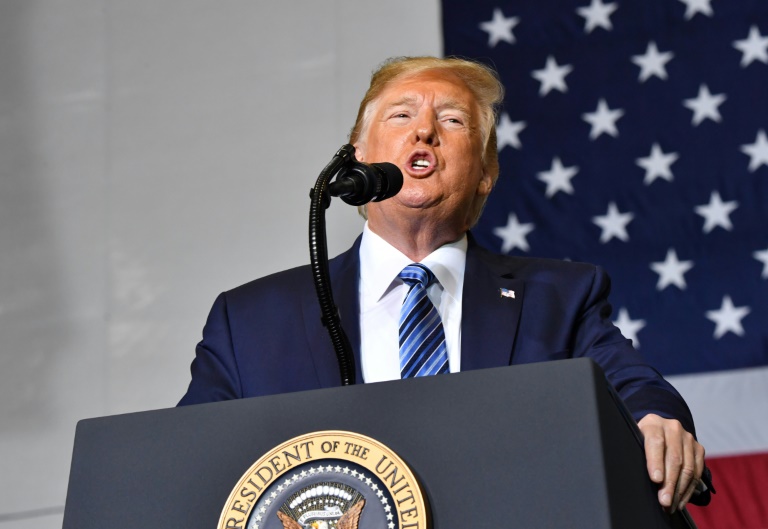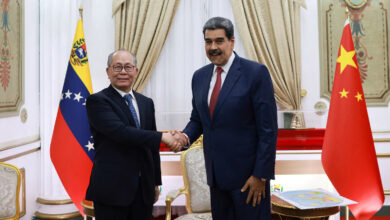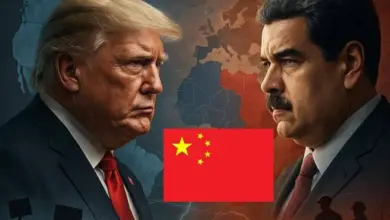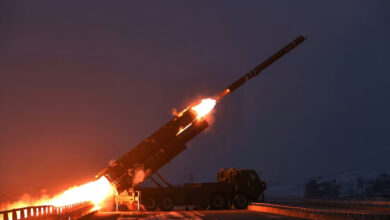
US President Donald Trump was assailed Tuesday for his hands-off approach to pro-democracy protests in Hong Kong, avoiding criticizing Beijing even as Chinese troops massed on the border to the territory.
Critics on both sides of the political spectrum accused Trump of abandoning longstanding US policy to support democratic movements and giving Beijing a green light to intervene in one of the world’s most important financial and trade centers, a semi-autonomous Chinese region.
As protestors battled police in Hong Kong’s airport Tuesday, partially shutting down air traffic, Trump appeared ambivalent, telling journalists the situation was “very tricky.”
“I hope it works out for everybody including China. I hope it works out peacefully, nobody gets hurt, nobody gets killed,” he said.
Trump urges calm
Shortly afterward, Trump tweeted that US intelligence confirmed that Beijing had sent troops to the Hong Kong border.
“Everyone should be calm and safe!” Trump wrote, retweeting a video of People’s Liberation Army trucks in the Chinese city of Shenzhen.
But the US leader had no words in support of the protestors as Hong Kong experiences its largest crisis since the British handover of its former colony to China in 1997.
After more than four months of protests, his administration has mainly called for both sides to avoid violence, while denying Beijing’s accusations of US interference.
“Trump favors both sides in Hong Kong protests. Hardly a profile in courage,” said Nicholas Burns, a former senior US diplomat now at the Harvard University Kennedy School.
“The only side the US should be on is democratic rights for the people of Hong Kong.”
‘Green light’ for Xi Jinping
The protests, which began in March and have intensified since then, are against a move by the Hong Kong government to allow the extradition of criminal suspects to China, which opponents view as an incursion into Hong Kong’s more transparent justice system.
But they have come as Chinese President Xi Jinping’s and Trump’s governments have plunged ever deeper into a wrenching battle over trade that is dragging down the economies of both, with no sign of a resolution.
In late July Trump praised Xi’s approach to the protests, one day after organized triad gangsters attacked protestors, sending 45 to hospitals.
“China could stop them if they wanted,” he said.
“I think President Xi of China has acted responsibly, very responsibly,” he said.
Days later, he blasted China’s trade policies but, regarding the Hong Kong protests, said Beijing “doesn’t need advice.”
“That’s between Hong Kong and … China, because Hong Kong is a part of China,” he said.
Thomas Wright, a foreign policy expert at the Brookings Institution, accused Trump of essentially giving Xi “a green light” to intervene in the territory.
In a tweet Wright called it the “Worst foreign policy decision of his presidency.”
‘Defining moment’
His stance on Tuesday contrasted with those of top legislators in Congress.
Senior Republican Senator Lindsey Graham called the Hong Kong situation “a defining moment for US-China relations.”
“30 years after Tiananmen Square all Americans stand with the peaceful protesters in Hong Kong. These protests highlight the moral authority of their demands for Freedom and Democracy,” he wrote.
Another Republican, Marco Rubio, rejected the view that the protests were an “internal matter” of China’s.
“Given their history of repression, Chinese troops massed on border is cause for grave concern,” Rubio wrote.
Democrats meanwhile more directly attacked Trump for what one, Representative Jim McGovern, called “dangerous” language that “invites miscalculation.”
“Warn Beijing of serious consequences if it cracks down on peaceful protesters,” he told Trump.
Senator Chris Murphy said US support for democracy activists in other countries has long been extremely important.
“It’s also hard to overstate how devastating it is when they risk it all to speak up for these ‘American’ values, and America is silent,” he wrote on Twitter.
“This is not foreign policy,” he said.
Image: AFP / Nicholas Kamm As Hong Kong pro-democracy protestors partially shut down the territory’s airport, US President Donald Trump avoided supporting them, saying he hopes that ‘nobody gets hurt’




